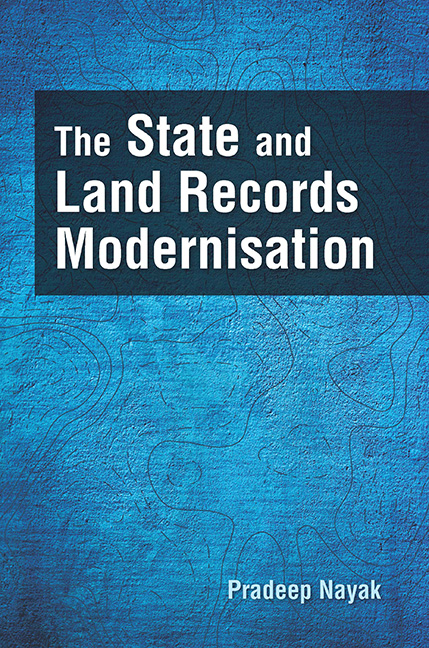Book contents
- Frontmatter
- Dedication
- Contents
- List of Figures and Tables
- Foreword
- Preface
- List of Abbreviations
- 1 The State, ICTs and Governance: A Theoretical Exploration
- 2 E-Governance in Public Policy Discourse in India
- 3 The State and the Policy of Land Records Management
- 4 The Computerisation of Land Records Programme in Odisha
- 5 The Computerisation of Land Records Programme in Karnataka
- 6 The Computerisation of Land Records Programmes in Karnataka and Odisha: A Comparative Study
- Conclusion: Beyond Techno-Managerial Governance
- Select Bibliography
- Index
1 - The State, ICTs and Governance: A Theoretical Exploration
Published online by Cambridge University Press: 02 December 2022
- Frontmatter
- Dedication
- Contents
- List of Figures and Tables
- Foreword
- Preface
- List of Abbreviations
- 1 The State, ICTs and Governance: A Theoretical Exploration
- 2 E-Governance in Public Policy Discourse in India
- 3 The State and the Policy of Land Records Management
- 4 The Computerisation of Land Records Programme in Odisha
- 5 The Computerisation of Land Records Programme in Karnataka
- 6 The Computerisation of Land Records Programmes in Karnataka and Odisha: A Comparative Study
- Conclusion: Beyond Techno-Managerial Governance
- Select Bibliography
- Index
Summary
Introduction
The study of the role of the state in promoting ICTs adoption and governance reforms is now being recognised world over as central to any discussion on administrative reforms or modernisation of the public sector. The state in India, as in other parts of the world, is no longer impervious to the challenges of Information and Communication Technologies (ICTs). Rather, new and interesting terminologies like virtual state, automated state, network state, information polity, informatisation of public administration, digital era governance, e-governance and smart governance have been repeatedly used in research works and public policy documents.
Neoliberal economic reforms and the IT revolution have influenced the role of the state in society and economy, as well as its relationship with citizens. All over the world, governments have made elaborate policy and institutional changes for the early adoption of cutting-edge technologies like ICTs in their governance structures as well as processes. International financial institutions like the World Bank, IMF and ADB and international organisations such as UNDP and UNCTAD have been prominent votaries for the adoption of ICTs in public administration. The rapid use of ICTs by the governments and the popularity of web pages of government departments led some scholars to describe ICTs as the ‘new face of government’ and ‘a new vehicle for citizen initiated contacts’. The role of the Indian state has been crucial in the phenomenal growth of informatics development. The Indian state has been actively promoting the informatics sector and such promotional and infrastructural activities of the Indian state, coupled with its success in building public and private networks, has been crucial to India's emergence as a global player in the IT sector. Such a perspective is important to understand the contemporary Indian state's integral role in determining and promoting, on a massive scale, the application of ICTs and IT industry in its governance structures for better service delivery, ushering transparency, empowering people, improving efficiency and furthering the interface of the state with IT business and industry. According to Peter B. Evans, the role of the Indian state through its regulatory agencies and stateowned ICT industries during the 1980s revealed tentative attempts to increase state action aimed at complementing and promoting private entrepreneurship.
- Type
- Chapter
- Information
- The State and Land Records Modernisation , pp. 1 - 35Publisher: Foundation BooksPrint publication year: 2015

